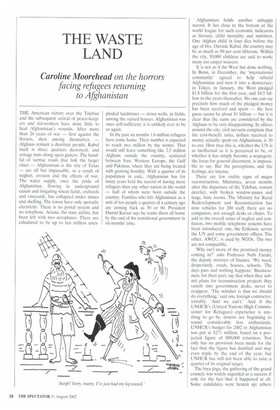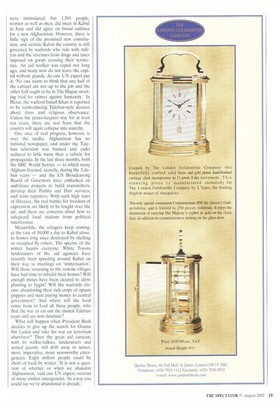THE WASTE LAND
Caroline Moorehead on the horrors
facing refugees returning to Afghanistan
THE American victory over the Taleban and the subsequent arrival of peace-keepers and aid-workers have done little to heal Afghanistan's wounds. After more than 20 years of war — first against the Soviets, then among themselves — Afghans remain a destitute people. Kabul itself is three quarters destroyed, and sewage runs along open gutters. The handful of tarmac roads that link the larger cities — Afghanistan is the size of Texas — are all but impassable, as a result of neglect, erosion and the effects of war. The water supply, once the pride of Afghanistan, flowing in underground canals and irrigating wheat fields, orchards and vineyards, has collapsed under mines and shelling. The towns have only sporadic electricity. There is no postal system and no telephone. Ariana. the state airline, has been left with two aeroplanes. There are calculated to be up to ten million unex ploded landmines — down wells, in fields. among the ruined houses. Afghanistan was once self-sufficient; it is unlikely ever to be so again.
In the past six months 1.6 million refugees have come home. Their number is expected to reach two million by the winter. That would still leave something like 2.5 million Afghans outside the country, scattered between Iran, Western Europe, the Gulf and Pakistan, where they are being treated with growing hostility. With a quarter of its population in exile, Afghanistan has for many years held the record of having more refugees than any other nation in the world — half of whom were born outside the country. Families who left Afghanistan as a unit of ten people a quarter of a century ago are coming back as 50 or 60. President Hamid Karzai says he wants them all home by the end of his transitional government in six months' time. Afghanistan holds another unhappy record. It lies close to the bottom of the world league for such economic indicators as literacy, child mortality and nutrition. One Afghan child in four dies before the age of five. Outside Kabul, the country may be as much as 90 per cent illiterate. Within the city, 50,000 children are said to work; many are carpet weavers.
It is not as if the West has done nothing. In Bonn, in December, the 'international community' agreed to help rebuild Afghanistan and turn it into a democracy; in Tokyo, in January, the West pledged $1.8 billion for the first year, and S4.5 billion in the years thereafter. No one can say precisely how much of the pledged money has been received and spent — the best guess seems be about $1 billion — but it is clear that the sums are considered by the Afghans to be very disappointing. In offices around the city, civil servants complain that the cost-benefit ratio, dollars received to money actually spent on Afghanistan, is 30 to one. How true this is, whether the UN is as ineffectual as it is perceived to be, or whether it has simply become a scapegoat, the focus for general discontent, is impossible to say. But the perceptions, and the feelings, are intense.
There are few visible signs of major reconstruction. Ministries, seven months after the departure of the Taleban, remain derelict, with broken window-panes and large, bare rooms. The Ministry for Rural Redevelopment and Reconstruction has nine vehicles for 200 staff; there are no computers, not enough desks or chairs. To add to the overall sense of neglect and confusion, two mobile telephone systems have been introduced: one, the Eriksson, serves the UN and some government offices. The other. AWCC, is used by NG0s. The two are not compatible.
'Why isn't more of the promised money coming in?' asks Professor Nabi Farahi, the deputy minister of finance. 'We need, desperately, roads, houses, schools. The days pass and nothing happens.' Businessmen, for their part, say that when they submit plans for reconstruction projects they vanish into government desks, never to reappear. 'The mindset is that we should do everything,' said one foreign contractor, irritably. 'And we can't.' And if the UNHCR's (United Nations High Commissioner for Refugees) experience is anything to go by, donors are beginning to sound considerably less enthusiastic. UNHCR's budget for 2002 in Afghanistan was put at $271 million, based on a projected figure of 800,000 returnees. Not only has no provision been made for the fact that the figure has doubled and may even triple by the end of the year, but UNHCR has still not been able to raise a quarter of its original target.
The loya jirga, the gathering of the grand council, was widely regarded as a success if only for the fact that it happened at all. Some candidates were beaten up; others were intimidated: but 1,501 people, women as well as men, did meet in Kabul in June and did agree on broad outlines for a new Afghanistan. However, there is little sign of the promised new constitu tion, and outside Kabul the country is still governed by warlords who rule with militias and the revenues from drugs and taxes imposed on goods crossing their territories. An aid worker was raped not long ago, and many now do not leave the capital without guards. As one UN expert put it: 'No one wants to think that one half of the cabinet are not up to the job and the other half ought to be in The Hague awaiting trial for crimes against humanity.' In Herat, the warlord Ismail Khan is reported to be reintroducing Taleban-style decrees about dress and religious observance. Unless the peace-keepers stay for at least ten years, there are real fears that the country will again collapse into anarchy.
One area of real progress, however, is over the media. Afghanistan has no national newspaper, and under the Taleban television was banned and radio reduced to little more than a vehicle for propaganda. In the last three months, both the BBC World Service — to which many Afghans listened, secretly, during the Taleban years — and the US Broadcasting Board of Governors have embarked on ambitious projects to build transmitters, develop their Pashto and Dui services, and train reporters. With such high rates of illiteracy, the real battles for freedom of expression are likely to be fought over the air, and there are concerns about how to safeguard local stations from political interference.
Meanwhile, the refugees keep coming, at the rate of 10,000 a day to Kabul alone, to homes long since destroyed by shelling or occupied by others. The spectre of the winter haunts everyone. White Toyota landcruisers of the aid agencies have recently been speeding around Kabul on their way to meetings on 'winterisation'. Will those returning to the remote villages have had time to rebuild their homes? Will enough mines have been cleared to allow planting to begin? Will the warlords discuss abandoning their rich crops of opium poppies and start paying money to central government? And where will the food come from to feed all these people, who fled the war or sat out the dismal Taleban years and are now destitute?
What will happen when President Bush decides to give up the search for Osamu bin Laden and take his war on terrorism elsewhere? Then the great aid caravan, with its walkie-talkies, landcruisers and armed guards, will drift away to newer, more imperative, more newsworthy emergencies. Eight million people could be short of food by winter. it is not a question of whether or when we abandon Afghanistan,' said one UN expert, veteran of many similar emergencies. 'In a way you could say we've abandoned it already.'



























































 Previous page
Previous page